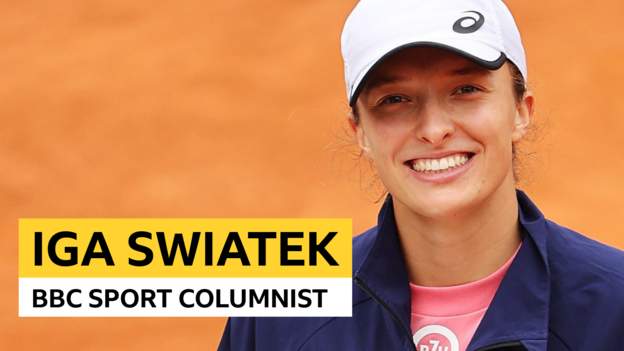
Poland's Iga Swiatek, who shot to fame by winning the 2020 French Open title as a 19-year-old, is the latest WTA Tour star to feature in a BBC Sport column.
After beating Russia's Daria Kasatkina on Saturday to reach the Australian Open last 16, Swiatek talks about meeting her idol Rafael Nadal, becoming a role model herself and how she aims to help youngsters in Poland through charity work.
I have never considered myself as a role model. I have only been on tour for three years and I'm still at the very beginning of my career, so it is hard to think of myself that way.
But I meet kids - particularly in Poland - that are really excited when they see me. That gives extra motivation and inspires me.
It's strange because I remember when I was their age - it was not that long ago!
It is really great I can make their day somehow and I really like that. I remember getting autographs myself at a WTA tournament in Warsaw where I was a ball kid.
I still have all the autographs, I think they are maybe in the attic. I was a ball girl at a Caroline Wozniacki match which was cool because she has Polish roots and she was one of the best players in the world.
I remember when I was throwing that ball to her I was really stressed that it would not reach her! But it was so exciting. I had never been at a top sports event like that and seeing the best players so close made my year.
When I see these kids are excited to see me, I'm still sometimes surprised. I'm not used to it yet. When I'm just living my life at home I'm just Iga and the same person I was a few years ago.
Of course I've changed because I'm growing up and developing as a person and a player. But I have the same values and treat myself the same way.
You may have heard I'm a big fan of Rafael Nadal and when I met him for the first time it was pretty cool to see he is down to earth.
He was really humble and it doesn't seem like the success has changed him. If I'm going to win more Grand Slam titles and have more success in my career then I hope I will be like Rafa.
At Roland Garros last year we hit together on court. When we met it felt surreal. I was super excited and I could not stop smiling for about five minutes.
I wanted to see how Rafa was in real life and he was making fun of his forehand which is crazy because he has the best forehand ever in my opinion.
I remember at my first Grand Slam I had to push myself to get his autograph because I was nervous. So hitting with him a few years later was the kind of moment where you can see how much progress you have made and what you have been through.
Eventually I want to have a foundation of my own - like Rafa and other players - and one which gives tennis scholarships to young kids in Poland.
I know how hard it was for my dad to invest in me. I don't want other talented kids to have the same problems that I had at the beginning.
They might not have the money for training or physiotherapy so I want to try and make it easier for them to develop.
It's not a specific plan yet, just an idea. At the moment I need to focus on my career so will develop that when I am a little older.
But over the past couple of years, since winning Roland Garros really, I have started doing work with charities in Poland.
At Indian Wells last year, I decided to give my third-round prize money to two mental health organisations in Poland which help kids. That was a spontaneous decision which I made because it was World Mental Health Day.
I work with one of Poland's biggest charities which supports a children's health service - The Great Orchestra of Christmas Charity - and recently I gave them the racquet with which I won the Rome title last year.
That will be auctioned, along with the chance for a practice with me.
Another of the organisations I support is a project helping families and children struggling with poverty.
Last Christmas, I helped a family where a father and daughter were diagnosed with cancer and they needed money for the therapy.
These things are not time consuming for me, but I do it because I find it is satisfying to help others.
Also, since turning professional and winning big tournaments, I have the money to try to make a difference. I know other people don't have that luxury.
Changing perceptions of other people who might not be aware of these issues - particularly in Poland - is another reason.
Maybe I can have a little influence and if I can make it better somehow for some people then I will be happy.
Iga Swiatek was talking to BBC Sport's Jonathan Jurejko at Melbourne Park.















 Phone: (800) 737. 6040
Phone: (800) 737. 6040 Fax: (800) 825 5558
Fax: (800) 825 5558 Website:
Website:  Email:
Email: 






